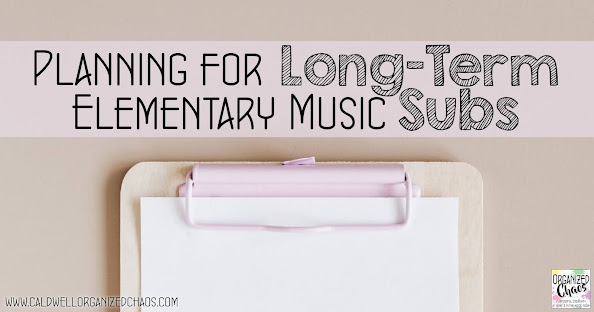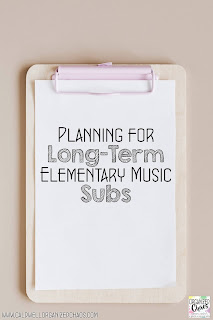1. Identify the most critical concepts
The first step is to take a look at your yearly curriculum outline and see which skills and concepts you would have been working on during your planned absence. If you don't have a yearly outline for when you are going to cover what, you'll need something to go off of! List the concepts you've covered so far this school year and identify what needs continued practice/ what hasn't been addressed yet this year for each grade so you have an idea of what would normally come next in your teaching (this post includes a lot more specifics about developing long-range plans).
Once you know what would have normally been covered in your absence, it's time to prioritize. Which skills and concepts are ones that students will be building on for future learning? Rhythm and pitch concepts are the obvious ones where students are learning a few new concepts at a time that build on each other from year to year, and are harder to make up if students lose a lot of learning time. Are there certain topics that are too difficult/ nuanced for a substitute to handle? Introducing recorder playing for the first time, or exploring the music of Cambodia, for example, probably require more background knowledge and experience than most substitutes can be expected to have.
Out of the list of concepts you would normally cover, identify the ones that are most important for students to work on, and practical for a sub to be able to cover, in your absence. For those that you're taking out, decide if they are things that you can trade with other things you would have covered later in the year (like switching the Cambodian music unit with the lessons on treble clef letter names), condense into future lessons (like introducing the new dynamics vocabulary they miss when you introduce the other new dynamics vocabulary the following year), or just skip (maybe recorders are just not practical for this school year).
2. Identify a few manageable activities for each
If you are in a situation where you have a long-term sub with a music education background and/or you don't need to provide plans, you may want to stop at step 1 and just give the substitute the list of concepts to cover. If not, once you have a shortened list of concepts you hope students can work on in your absence, the next step is to identify some manageable activities for each of those concepts. Those may be review games, play-along or sing-along videos, composing and creating projects, or other activities where substitutes are primarily managing the activity itself rather than being responsible for modeling a musical concept or teaching a new song etc. If you're clear on the specific concepts you're targeting, it's much easier to come up with a few activities for each one!
3. Find (or make) demonstration videos
If you have the time to work ahead, and especially if you know your substitute has no musical background, the best way to make sure students are able to practice the concepts correctly is to include some demonstration videos: clapping and counting rhythms, singing and showing the hand signs for solfege, demonstrating playing techniques, etc. Just having those short videos demonstrating the concept that can then be practiced in the activities will take so much pressure off of the substitute, ensure the concepts are being practiced correctly, and the same video can be used over and over for any activities that go with that concept.
The good news here is that 1) I know I'm not the only one who has gotten so much faster at whipping up quick videos like this on Screencastify or Zoom and 2) there are SO MANY videos already made by other music teachers on YouTube that you can use instead of making your own! Just search for the concept ("quarter notes lesson") and you can probably find something already made from all the distance learning lessons we were all making earlier in the pandemic.
4. Include some generic, multi-age activity ideas
Substitutes can't possibly be expected to cover the same amount of material we normally would within a certain time frame- even the most well-prepared subs need time to build relationships with students. Along with more content-specific lesson activities, it's helpful to include materials for some generic music-related activities that can be done with multiple grade levels. These are great for when the sub first starts to get to know the students, to have as back-up if they have extra time, or to switch gears when something isn't working. Boomwhacker play-along videos, musical instrument bingo, freeze dance, music-related books, and playlists of videos or audio recordings to listen and respond to are great low-prep examples that can be done with a wide range of ages and repeated throughout the absence.
5. Identify a go-to (or two)
One of the best gifts to give a long-term sub, and yourself, is to identify someone in the building and/or in your department who is willing and able to be the contact person for advice and trouble shooting while you're out. That person should be familiar with whatever plans you've left, how you generally run your classes, what your schedule is like etc, or know who to ask if they don't know something. If you're going to be out for a long-term absence you don't want to feel any responsibility to be answering questions and putting out fires while you're away, and the substitute will feel much more comfortable reaching out to someone if they know they've agreed to be the contact person and they know they don't have to bother you while you're out!
Important Reminder
Again, it's important to say that how much responsibility a teacher has to provide plans and materials for a long-term sub will depend on the situation- you may only need one or two of the points above, or you may want to use them all. And let's be honest, sometimes the best laid plans don't end up being used at all! It's good to keep in mind that some lost learning time is not the end of the world- you will figure it out when you get back- so if you don't have the capacity to prepare for your substitute for any reason, or if you find out partway through your absence that your plans have been ignored, make like Elsa and let it go. But I know for me I have a much easier time stepping away if I at least equip the students and the substitute with the opportunity to continue their learning and stay engaged, so this is what I've found most practical and helpful for doing that.
If you've been out for a long-term absence recently and have words of advice or caution based on your positive or negative experiences, please leave them in the comments! It can be overwhelming to prepare for an absence while also dealing with your ongoing teaching responsibilities and no doubt dealing with whatever you are needing a long-term absence for!



I have planned for 3 maternity leaves and this is great advice! I was lucky enough on 2 of them to get subs who had just finished their student teaching (in music) and hadn’t got a real job yet. Both of them were fantastic—I left them with my GamePlan curriculum and a lot of Google docs with notes and ideas, and when I came back my students had pretty much learned what I expected. They also both had to conduct concerts for my middle school and high school choirs. The middle sub was not awesome and when I came back I discovered that, despite all of my well-laid plans, ideas, and directions, the students seemed to have spent an awful lot of time watching movies while I was gone. 🤦🏻♀️ But you know, it wasn’t the end of the world, and they were mostly just happy to have me back!
ReplyDeleteThat is so awesome that you had 2 really great subs, and I bet it was perfect for them to have the chance to get started in music education too! And such a good point about the other one- regardless of what happens, the students will be happy to have you back and you'll all get through it :)
Delete